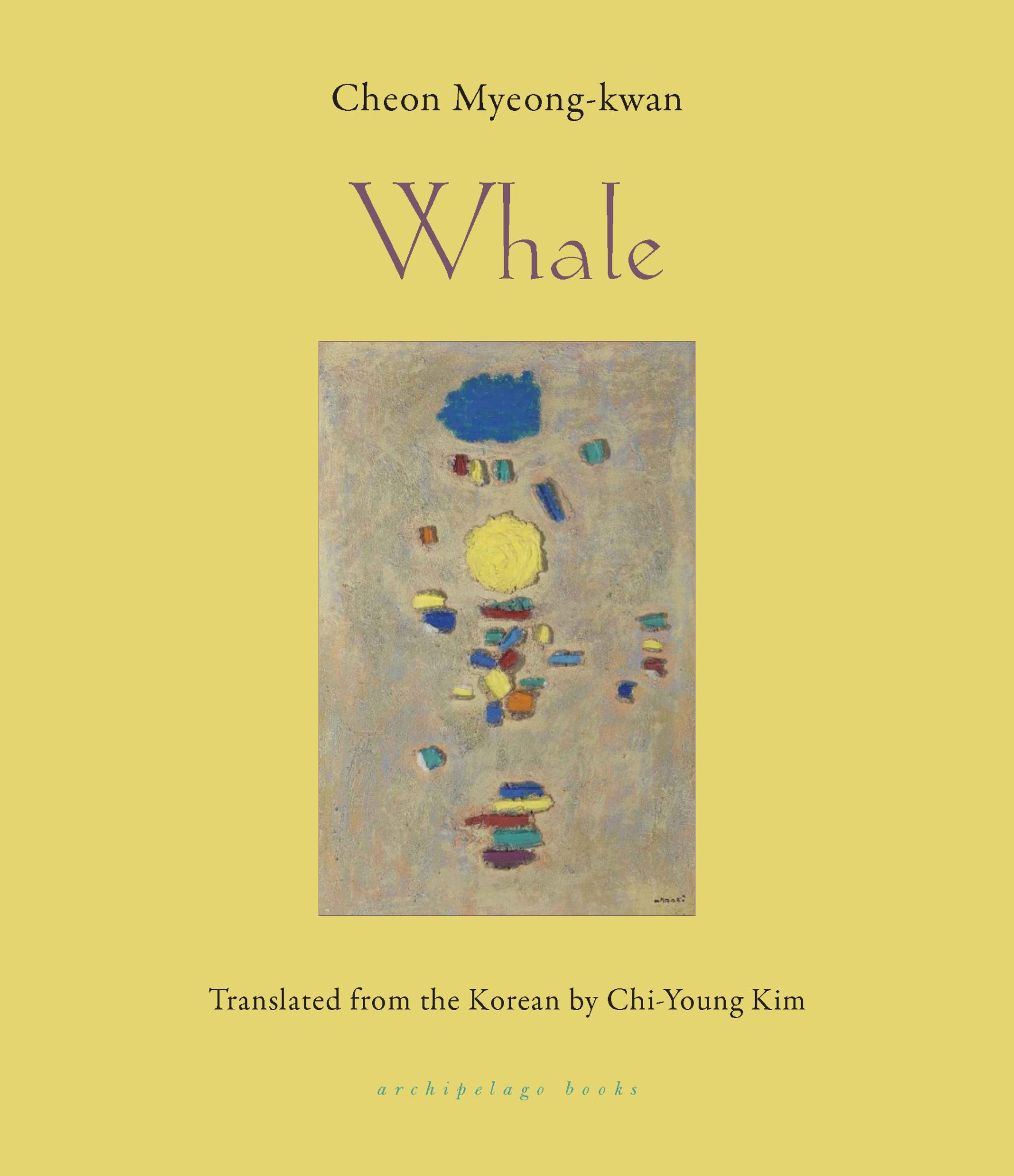Whale
Translated from Korean by Chi-Young Kim
Published: May 9, 2023
Paperback ISBN: 9781953861146
Ebook ISBN: 9781953861153
Whale, set in a remote village in South Korea, follows the lives of three linked characters: Geumbok, an extremely ambitious woman who has been chasing an indescribable thrill ever since she first saw a whale crest in the ocean; her mute daughter, Chunhui, who communicates with elephants; and a one-eyed woman who controls honeybees with a whistle. Brimming with surprises and wicked humor, Whale is an adventure-satire of epic proportions by one of the most original voices in South Korea.
Whale is available as an audiobook here.
Told in an omniscient and playful narrative voice, smoothly translated by Chi-Young Kim, this is a distinctly Korean take on Great Expectations, a tale of aspiration and folly punctuated with artisanal bricks and dried fish . . . an affecting theme emerges about the sins of mothers, while philosophical notions broach the comic . . . and the profound . . . The novel succeeds thanks to its multi-sensual atmosphere of strangeness and a conflicted protagonist who simply refuses to accept the mundane.
— Christian House, Financial Times
Whale is a rollercoaster adventure through Korean history and culture, a magical and grotesque epic...The plot twists and turns and hurtles along in a way that makes you pleasantly dizzy; the imagery and language in the book are also so rich, with the innocence and darkness of a fairy-tale combined with a playful sense of irony. The translator Chi-Young Kim has done an amazing job, the translation is so dynamic and full of life.
— The International Booker Prize 2023 judges
Whale gives new meaning to the generation-spanning epic. Cheon expertly inserts metafictional jousts into his stirring prose, sardonically toying with our need for narrative even as he explores his characters' lives with heartfelt urgency. Wonderfully translated by Kim, Whale is an intricate work of art with unexpected riches.
— YZ Chin
A spry, cunning work of invigorated tale-telling. Cheon Myeong-kwan harnesses the ferociously erratic flow of shared narratives, embracing their natural disposition toward salacious detail at every turn. Whale is a billowing, boundless novel.
— Justin Walls, Bookshop.org
Whale has leaped over the boundaries of a novel and entered a new space.
— Shin Su-jeong
Pitched in tone somewhere between Katherine Dunn’s Geek Love and Salman Rushdie’s Shame, Whale is both a surreal story of a haunted (literally and metaphorically) family and a bizarre look at one nation’s history. Blending betrayals worthy of film noir with harrowing stories of corruption and abuses of power, Whale shifts wildly in tone but is never less than compelling.
— Tobias Carroll, Words Without Borders
A novel that seduces.
— JoongAng Ilbo
A peerless work devoted to telling a powerful story and lauded for expanding Korean literature into new dimensions.
— The Hankyoreh
[Whale] redefines what fiction can be.
— The Kyunghyang Sinmun
Whale overflows with freshness. That's what makes it special.
— OhmyNews
There has never been a novel like this in Korean literature ... A novel that's more like reading out loud than reading quietly to oneself; its structure is like that of a folktale. You can feel the oral tradition in the rhythm of the sentences.
— Lee Dong-jin
A multi-generational story detailing the lives of three women—grandmother, mother, and daughter—from Korea’s lowest social class, demonstrating resilience, cleverness, and loyalty in the name of survival in a poor, rural, and heavily patriarchal society that has little but contempt for females . . . Imbued with a sense of the mythical and archetypal . . . the novel’s actors seem as fatally flawed as any lead character in a play by Aeschylus.
— Tom Bowden, The Book Beat
This folklore-inspired novel follows three women across rural and coastal South Korea to tell a sweeping, Dickensian story of ambition, magic and folly.
— The New York Times
I fell deeply into Cheon Myeong-kwan’s Whale, rendered into melancholic, wondrous English by Chi-Young Kim.
— Zachary Issenberg, The Millions
Whale is hard to describe but even harder to put down. Is it a fable, a folktale, a fantasy or even a statement on how women are treated by society in general? That can only be decided by the reader . . . This is a haunting story that will stay with you long after the last chapter ends.
— Cindy Alexander, Pittsburgh Post Gazette
Cheon appears especially attuned to injustices which befall his female characters . . . The indelible poignancy of these women’s experiences owes itself to Cheon’s exquisite prose, skillfully translated by Chi-Young Kim . . . There’s a breathtaking amount of story here, replete with surrealist undercurrents and the colors, smells, and textures of everyday Korean life.
— Ellie Eberlee, The Massachusetts Review
Whale is an astounding epic: part multigenerational epic, part mother-daughter saga, imbued with magical realism and a satirical lens on the post-Korean War years. Using a panoply of characters and fantastical elements, Myeong-Kwan explores love and loss, politics and class, desire and family. This book is big, in so many senses of the word.
— Kelsey F., Powell's Bookstore
Whale reveals how disability is socially constructed through a dichotomized language of normalcy and deviation, and how society can intensify the marginalization and isolation of people with obvious disabilities in an intricate web of social identities.
— Kyunghee Ma, Affilia: Feminist Inquiry in Social Work

